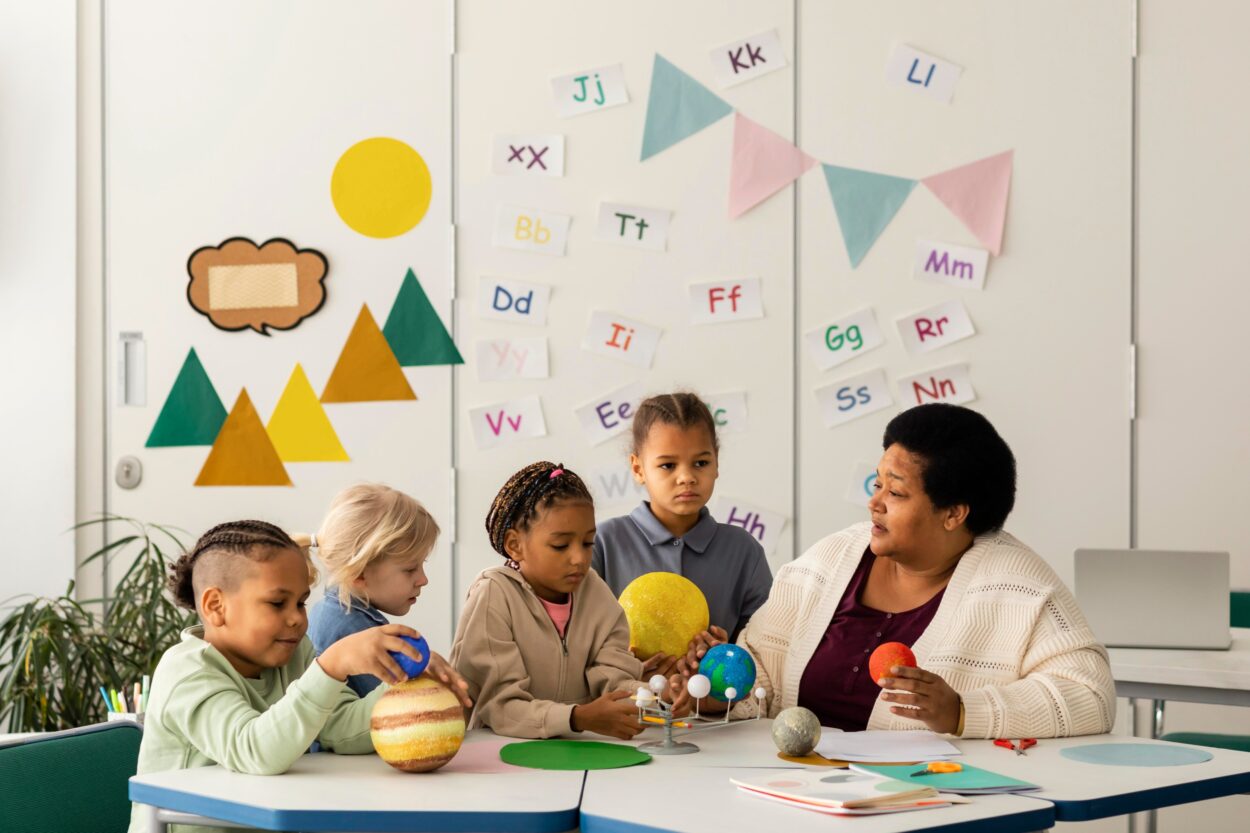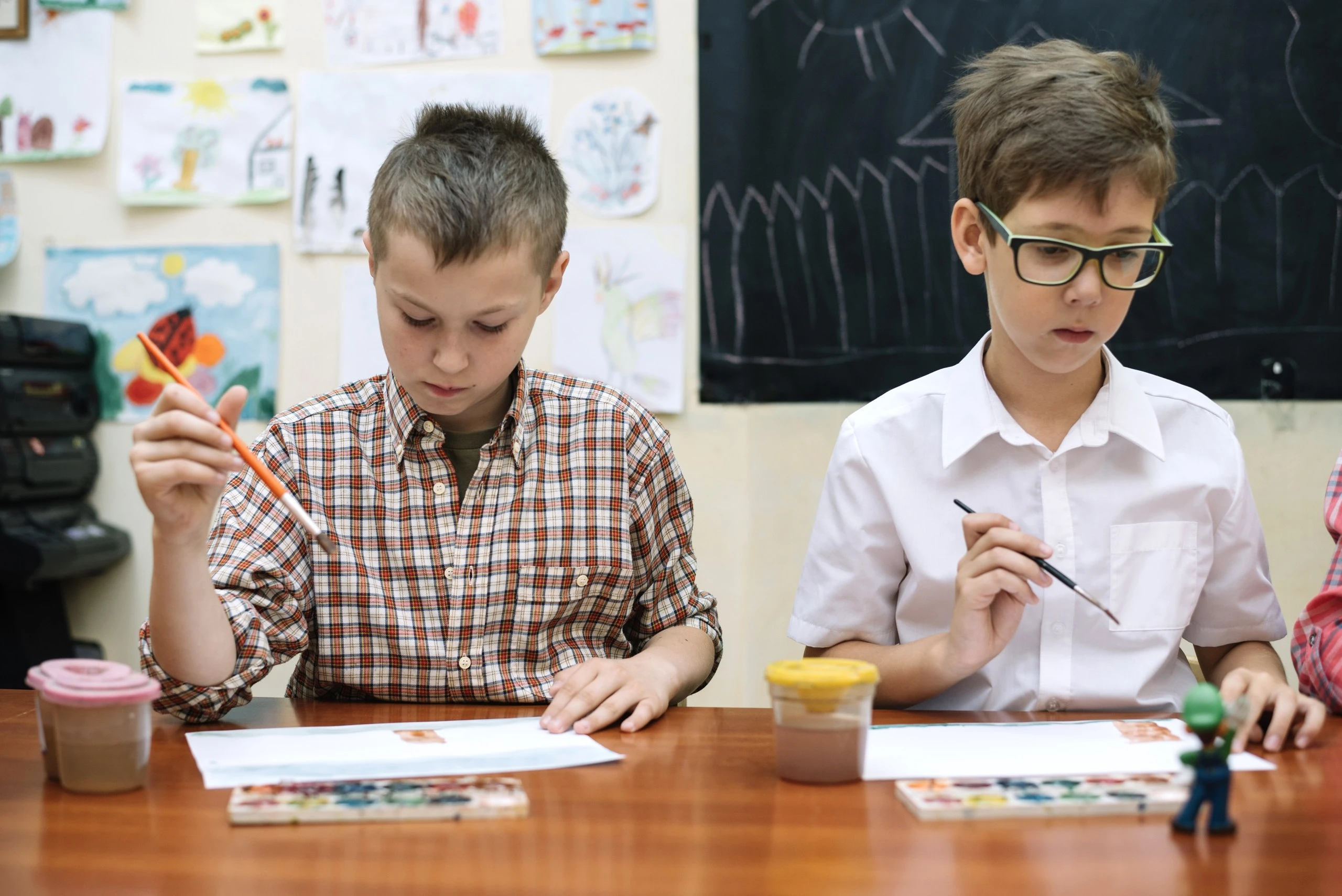In the vibrant landscape of early childhood education in Australia, a myriad of approaches emerges, each designed to foster the holistic development of young minds. From play-based learning to Montessori methods, Australia embraces diverse early learning philosophies. In this blog, we delve into the rich tapestry of early learning approaches, shedding light on their distinctive features and the impact they have on children’s development. Join us on a journey to explore the dynamic world of early education in Australia.
Play-Based Learning in Australia: Where Fun Fuels Future Learners
In Australia’s vibrant early childhood education landscape, play-based learning reigns supreme. Unlike traditional, didactic methods, this approach recognises the immense value of play in fostering all aspects of a child’s development – cognitive, social, and emotional. Educators meticulously craft environments brimming with open-ended activities, transforming playtime into a purposeful journey of skill-building.
But how exactly does play-based learning in Australia benefit young minds?
Igniting Curiosity & Problem-Solving
Imagine children engrossed in building elaborate block towers, strategising solutions to overcome wobbly structures. This playful exploration fuels their natural curiosity, encouraging them to ask questions, experiment, and discover solutions – valuable skills that translate beautifully into academic settings and beyond.
Collaboration & Communication
From role-playing doctors and patients to creating fantastical stories together, play-based learning in Australia encourages collaboration and communication. Children learn to negotiate, share ideas, and work towards common goals, fostering vital social skills that set the stage for future success.
Laying the Groundwork for Learning
When children are engaged and having fun, they’re more receptive to learning. Playful activities subtly weave in foundational skills like literacy and numeracy. For example, counting blocks or sorting toys by color strengthens early math concepts, while storytelling and dramatic play nurture language development.
Nurturing a Love of Learning
The positive associations linked to play create a lifelong love of learning. Children who experience the joy of discovery and exploration through play are more likely to approach future learning with enthusiasm and a growth mindset.
Play-based learning in Australia isn’t simply about entertainment; it’s a strategic approach that empowers young minds to thrive. By incorporating keywords like “early childhood education,” “benefits of play in child development,” and “play-based learning in Australia,” you effectively communicate the essence of this valuable educational philosophy.
Remember, parents and educators hold the key to unlocking the magic of play-based learning. By embracing this approach and creating nurturing environments, we can empower Australia’s future generation to become confident, creative, and lifelong learners.
Montessori Magic: Empowering Young Minds in Australia

Step into a Montessori education in Australia, and witness the transformative power of self-directed learning for children. Unlike traditional classrooms, here, children aren’t passive recipients of knowledge; they’re active explorers, guided by the Montessori principles of independence and discovery.
Imagine meticulously designed spaces filled with engaging materials, each meticulously chosen to spark curiosity and exploration. Children, free to choose their activities, delve into tasks that pique their interest. They practice pouring water, sorting objects, and manipulating puzzles, fostering practical life skills and building confidence.
This self-directed approach nurtures a natural love for learning. As children progress at their own pace, a sense of ownership and responsibility blossoms. They learn to problem-solve, collaborate, and make independent choices, building valuable skills that extend far beyond the classroom.
More than just academics, Montessori education in Australia cultivates a love for lifelong learning. Children become self-motivated, resilient, and adaptable, ready to tackle any challenge with confidence. So, if you’re looking for an approach that empowers young minds and ignites a passion for discovery, consider the magic of Montessori.
Unleashing Creativity: The Reggio Emilia Spark in Australian Early Learning
Forget paint-by-numbers and rigid curriculums – the Reggio Emilia approach in Australia embraces the boundless potential of children’s creativity. Inspired by the Italian philosophy, this approach views children as artists, storytellers, and innovators, nurturing their expression through diverse mediums.
Imagine classrooms transformed into vibrant studios, buzzing with the sounds of music, the brushstrokes of painting, and the whispers of dramatic narratives. Children aren’t passive learners; they’re active creators, collaborating on projects, exploring materials, and expressing their unique perspectives.
More than just playtime, this emphasis on early childhood arts education has profound benefits. It fosters critical thinking, problem-solving, and communication skills as children navigate artistic challenges and collaborate with peers. The Reggio Emilia approach in Australia goes beyond; it values the environment as the “third teacher.” Beautiful, thoughtfully curated spaces filled with natural light and open-ended materials spark curiosity and invite exploration.
This nurturing environment cultivates a love for learning that extends far beyond the classroom walls. Children who experience the joy of creative expression develop confidence, resilience, and a lifelong appreciation for the beauty and possibility in the world around them. So, let’s celebrate the Reggio Emilia approach in Australia and empower young minds to unlock their creative potential, one masterpiece at a time!
Steiner’s Symphony: Nurturing the Whole Child in Australian Waldorf Schools
Imagine a learning environment where imagination dances with academics, and artistic expression intertwines with practical skills. This is the essence of Steiner education in Australia – a philosophy inspired by Rudolf Steiner, known for its commitment to holistic child development.
In Waldorf schools across Australia, the traditional classroom takes a backseat to experiential learning. Children embark on a journey that encompasses academics, arts, and practical activities, carefully tailored to each developmental stage. Imagine young hands molding clay to create mythical creatures, while older students delve into historical narratives through role-playing. This unique blend ignites both cognitive and creative capacities, nurturing imagination, creativity, and a love for nature.
Steiner schools prioritise a deep connection to the natural world. Children spend time outdoors, exploring meadows, planting seeds, and caring for animals. This immersive experience fosters a sense of responsibility, environmental awareness, and a love for learning that extends beyond the classroom walls.
The curriculum in Steiner education in Australia unfolds organically, guided by age-appropriate activities. Instead of standardised tests, artistic endeavors and storytelling become opportunities for assessment, revealing the unique strengths and development of each child.
By embracing the holistic child development approach, Waldorf schools strive to equip children with not just academic knowledge, but also critical thinking, social-emotional intelligence, and a lifelong love of learning. So, if you seek an education that nourishes the whole child – mind, body, and spirit – consider the unique symphony of Steiner education in Australia.
Spark the Flame: Inquiry-Based Learning Ignites Young Minds in Australia
Step away from rote memorisation and step into the dynamic world of inquiry-based learning in Australia. This innovative approach is gaining traction, captivating young minds by igniting their curiosity and nurturing essential critical thinking skills for children.
Imagine classrooms buzzing with questions, not answers. Teachers act as facilitators, guiding children on exciting journeys of discovery instead of dictating information. Children delve into projects that pique their interest, posing questions, investigating possibilities, and solving problems along the way.
This hands-on, child-centered approach fosters a deep understanding of concepts. Instead of passively receiving information, children actively engage in research, analysis, and collaboration. They learn to formulate questions, gather evidence, and draw their own conclusions – invaluable skills for lifelong learning and success.
But the benefits of inquiry-based learning in Australia go beyond academics. It cultivates a love for exploration and discovery. As children become comfortable asking questions and seeking answers, they develop a growth mindset, embracing challenges and viewing mistakes as opportunities for learning.
This approach resonates deeply with children’s natural curiosity. Imagine their eyes lighting up as they investigate the life cycle of a butterfly or explore the mysteries of the solar system. Inquiry-based learning taps into this natural wonder, transforming classrooms into vibrant hubs of exploration and discovery.
The impact extends beyond the early years. By fostering critical thinking skills and a love for learning, inquiry-based learning in Australia equips children to become confident, independent thinkers, ready to tackle any challenge and make a positive impact on the world. So, let’s spark the flame of curiosity and ignite a lifelong love of learning through the power of inquiry!
Embrace Uniqueness: The Emergent Curriculum Blossoming in Australia
Imagine a classroom where learning isn’t confined to rigid schedules and pre-determined plans. This is the magic of the emergent curriculum in Australia, an approach that prioritises individualised learning and tailoring education to children’s needs.
Instead of a one-size-fits-all approach, educators become keen observers, documenting children’s interests, strengths, and emerging themes in their play and interactions. This forms the foundation for a flexible and responsive curriculum that organically flows with the children’s natural curiosities and developmental stages.
Picture children engrossed in building elaborate castles fueled by a fascination with medieval history. The teacher, noticing this spark, introduces age-appropriate books, storytelling sessions, and even simple construction activities incorporating medieval themes. This personalised approach ensures that learning resonates with each child’s unique interests, fostering deeper engagement and understanding.
The beauty of the emergent curriculum in Australia lies in its adaptability. As children’s interests evolve, so too does the learning journey. Imagine a group fascinated by insects transforming their dramatic play area into a buzzing ecosystem, complete with homemade bugs and leaf shelters. This flexibility allows for tailoring education to children’s needs in real-time, maximising their learning potential.
Moreover, this approach fosters a sense of ownership and agency in children’s learning. As they actively participate in shaping their curriculum, they become invested in the process, developing valuable skills like collaboration, problem-solving, and critical thinking.
The impact of the emergent curriculum in Australia extends far beyond the classroom walls. By recognising and nurturing individual strengths and interests, this approach empowers children to become confident, self-directed learners, ready to embrace challenges and thrive in a diverse world.
So, let’s celebrate the uniqueness of each child and unlock their potential through the dynamic and responsive beauty of the emergent curriculum.
Conclusion
Australia’s vibrant early learning landscape offers a diverse orchestra of philosophies, each playing a unique melody in fostering young minds. From the playful notes of play-based learning to the self-directed tones of Montessori, Reggio Emilia’s artistic crescendo, and the holistic harmony of Steiner education, each approach celebrates a distinct strength.
Inquiry-based learning ignites curiosity with its questioning chords, while the emergent curriculum adapts to individual needs with its responsive rhythm. This rich tapestry ensures every child finds their perfect instrument, fostering a lifelong love of learning.
Diversity in early childhood education
Australia embraces various philosophies, catering to individual needs and learning styles.
Benefits of different approaches
Each method cultivates specific strengths, ranging from creativity and independence to critical thinking and collaboration.
Focus on holistic development
Many approaches go beyond academics, nurturing social-emotional well-being and a connection to the world.
Importance of early learning
Investing in quality early education paves the way for future success and a lifelong love of learning Remember, the most beautiful melody arises from the harmonious blend of these diverse approaches. By understanding and appreciating each philosophy, we can create a nurturing symphony that empowers every child to thrive.



